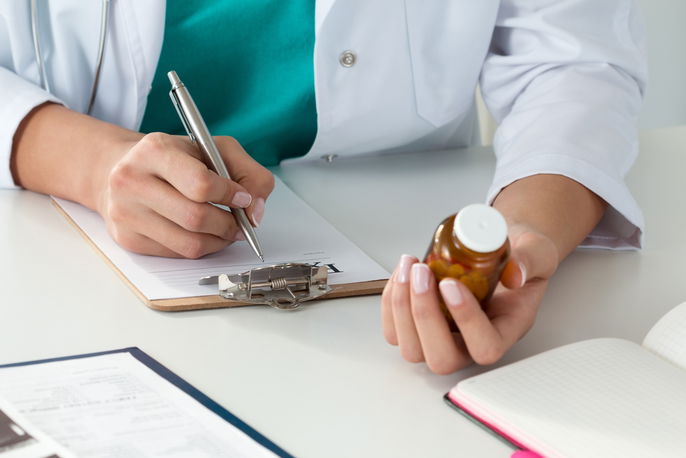Food poisoning medications, like azithromycin, metoclopramide and nitazoxanide, can be prescribed to help relieve symptoms of food poisoning as well as eliminate the harmful pathogens that are causing an intestinal infection.
Most times, food poisoning can be treated with rest and hydration. However, symptoms that persist for longer than 2 to 3 days, or symptoms that progressively worsen require further assessment and possible treatment with food poisoning medications.
Children, older adults and pregnant woman are most at risk for complications from food poisoning, and particularly require medical assessment and more targeted treatment. Read more about what causes food poisoning and complete our online quiz if you suspect it.

List of medications for food poisoning
Medications for food poisoning that your doctor may prescribe include:
1. Metoclopramide
Metoclopramide is an antiemetic that may be prescribed by your doctor to help relieve nausea and vomiting caused by food poisoning.
This remedy should only be taken as prescribed, and is available in the form of tablets, drops or oral solution.
Metoclopramide is contraindicated for children under 1 year of age and for people who have a history of bleeding, bowel obstruction, gastrointestinal perforation, epilepsy, pheochromocytoma, Parkinson's disease or movement disorders.
When pregnancy or breastfeeding, metoclopramide should only be taken if approved by your doctor.
2. Activated charcoal
Activated charcoal is recommended for the treatment of food poisoning because it able to absorb the toxins causing the symptoms. It also helps to reduce gastrointestinal absorption of the toxins and promotes their elimination.
The recommended dose is 1 capsule twice a day. It should not be taken with other medications, as it will interfere with their absorption and therapeutic effect.
3. Oral electrolytes
Oral electrolyte solutions help to replace salts, sugar and minerals lost from the vomiting or diarrhea caused by food poisoning. These solutions can be found over-the-counter, and should be used as directed by your doctor or pharmacist.
You can also make an oral saline solution at home. Check-out our recipe for saline solution and how to take it.
Cases of severe dehydration may require IV fluids in a hospital setting. Read more about how to stop diarrhea to prevent dehydration.
4. Scopolamine
Scopolamine, or scopolamine butylbromide, is an anticholinergic indicated to relieve intestinal cramps or stomach pain caused by food poisoning.
This medicine works by reducing contractions or spasms in the stomach and intestines, reducing the feeling of nausea and intestinal cramps.
Scopolamine should be used as prescribed, and it should not be taken by children, pregnant or breastfeeding women, or people with glaucoma.
5. Saccharomyces boulardii
Saccharomyces boulardii is a probiotic that may be prescribe by your doctor to help combat acute diarrhea caused by food poisoning.
This probiotic aims to restore the natural flora found in the gut, which can help reduce symptoms and strengthen the immune system.
Learn more about the benefits of probiotics and how to take them.
6. Azithromycin
Azithromycin is an antibiotic that can be prescribed for food poisoning caused by bacteria, such as Salmonella sp.
Also recommended: Salmonella: Symptoms, Causes & Treatment tuasaude.com/en/salmonellaHowever, the use of azithromycin, like other antibiotics, should only be used when symptoms are intense from high levels of circulating bacterial toxins.
In addition to azithromycin, your doctor may also consider other antibiotics such as metronidazole, clindamycin, tetracycline or ciprofloxacin. The antibiotic prescribe depends on the type of bacteria that caused the food poisoning.
7. Nitazoxanide
Nitazoxanide is an antiparasitic that can be prescribed for acute diarrhea from food poisoning caused by to protozoa. It can be indicated, for example, to treat cases of giardiasis or amoebiasis.
This medicine is also effective against viral infections, such as rotavirus or norovirus, which can cause food poisoning.
Nitazoxanide can be found in the form of tablets or powder for oral suspension, and should be taken as prescribed.
Home remedies
A great home remedy for food poisoning is drinking mulberry and chamomile tea. These teas contain an anti-diarrhea, bactericide and soothing action that helps to regulate intestinal flow. They can eliminate the microorganisms causing the food poisoning, and reduce the frequency of diarrhea.
Also recommended: Tea for Diarrhea: 10 Recipes with Medicinal Plants tuasaude.com/en/tea-for-diarrheaTo prepare these teas, add 1 teaspoon of chopped dry mulberry leaves and 1 teaspoon of chamomile leaves to 1 cup of boiling water. Then cover and allow to rest for 5 to 10 minutes. Strain and drink up to 3 times per day.
Another great home remedy is to suck on or chew a piece of ginger. Ginger is a natural antiemetic and can help reduce nausea and vomiting.
Read more about the treatment for food poisoning.
What to eat with food poisoning
During the first few days of food poisoning, you should ensure adequate hydration to restore any fluid losses from vomiting and diarrhea. You can drink water, fruit juices and teas, although coconut water and electrolytes purchased at the pharmacy are also great options.
When these symptoms start to improve or if they resolve, you should maintain a light diet with salads, fruit, cookies veggies and lean meat to promote easy digestion. See what to do for food poisoning and how to treat it using home remedies.






























